#poets review
Explore tagged Tumblr posts
Text
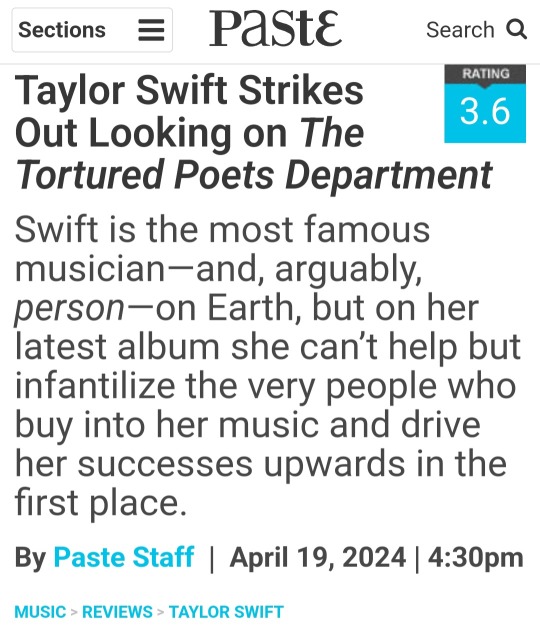
Sylvia Plath did not stick her head in an oven for this! When Taylor Swift took the Grammys stage last month to claim her award for Best Pop Vocal Album for Midnights, she saw that spotlight as an opportunity to announce her 11th studio album: The Tortured Poets Department. The follow-up cut to audience members—Swift’s music industry peers, mind you—told us all that we would ever need to know, and the collective disinterest across the crowd echoed through our TVs.
Folks from all walks of life took to social media to express a multitude of reactions. Swifties clamored to their beloved monarch’s forthcoming era, while others lambasted the terminally cringe title and artwork and ridiculed Swift for making a night recognizing musical achievements across an entire industry about herself—knowing perfectly well that it would send her fanbase into a surge that would, no doubt, overpower the excitement around the ceremony itself.
Quite a few people questioned whether or not that moment suggested that a critical—definitely not commercial—tide would turn against the world’s most-famous pop star. And, perhaps it has—but, to most, it will look like nothing more than a single ripple in Swift’s ocean of successes.
Swift remained relatively hush-hush about The Tortured Poets Department up until its release, leaving her fans, admirers and haters alike with nothing but an album title to ponder about. And it’s a bad title.
If you have never been in Swift’s corner, her taking the route of labeling her next “era” as “tortured” was likely catnip for your disinterest. If you are a fan—not necessarily a Swiftie, but even just a casual lover of her best and brightest work—you might be beside yourself about the first Swift album title longer than one word in 14 years.
In terms of popularity—certainly not always in terms of quality—no musician has been bigger this century than Swift, which makes it impossible to really buy into the “torture” of it all.
This is not to say that Swift being the most famous person in the world makes her immune to having multi-dimensional feelings of heartbreak, mental illness or what-have-you.
But, she has made the choice—as a 34-year-old adult—to take those complex, universal familiars and monetize them into a wardrobe she can wear for whatever portion of her Eras Tour setlist she opts to dedicate to the material.
Torture is fashion to Taylor Swift, and she wears her milieu dully. This album will surely get comparisons to Rupi Kaur’s poetry, either for its simplicity, empty language, commodification or all of the above.
And, sure, there are parallels there, especially in how The Tortured Poets Department, too, is going to set the art of poetry back another decade—as Swift’s naive call-to-arms of her own milky-white sorrow rings in like some quintessential “I am going to take pictures of a typewriter on my desk and have a Pinterest mood-board of Courier New font” iPhone fodder. 2013 called and it wants it capricious, suburban girl-who-is-taking-a-gap-year wig back!
Soaking our book reports in coffee or having our moms burn the edges with a kitchen lighter cannot come back into fashion; the cyclical notions of culture cannot make the space for such retreads.
There is nothing poetic about a billionaire—who, mind you, threatens legal action against a Twitter account for tracking her destructive private jet paths—telling stadiums of thousands of people every night that she sees and adores them.
Tavi Gevinson says it well in her Fan Fiction zine: “When 80,000 people are also crying, you become less special, too.” If Swift can return to one of her dozen beach houses across the world, kick up her feet and say “I’m a poet of struggle,” then who is to say that millions—maybe billions—of people with access to a notes app and a social media account won’t dream that dream, too?
Maybe that looks like a net-positive, but it’s inherently damning and destructive to take an art form that has long stood on the shoulders of resistance, of love and of opposition to power, systematic injustice and climate warfare and boil it down to the new defining era of your own 10-digit revenue empire. “My culture is not your costume,” yada, etc.
The Tortured Poets Department does begin with a shred of hope that, just maybe, Swift knows what she’s talking about—as she sneaks in a cheeky “all of this to say,” textbook transitional phrasing for poets, on opening track “Fortnight.”
But “Fortnight” unmasks itself quickly as a heady vat of pop nothingness, though it isn’t all Swift’s fault. “I was a functioning alcoholic, ‘til nobody noticed my new aesthetic,” she muses, attempting to bridge the gap between a behind-the-scenes life and on-stage performance—only for it to occur while propped up against the most dog-water, uninspired synth arrangement you could possibly imagine.
Between producer Jack Antonoff’s atrocious backing instrumental and the Y2K-era, teen dramedy echo chamber of a vocal harmony provided by out-of-place guest performer Post Malone, “Fortnight” chokes on the vomit of its own opaqueness.
“I took the miracle move-on drug, the effects were temporary,” Swift muses, and it sounds like satire. This is your songwriter of the century? Open the schools.
The Tortured Poets Department title-track features some of Swift’s worst lyricism to-date, including the irredeemable, relentlessly cringe “You smoked then ate seven bars of chocolate, we declared Charlie Puth should be a bigger artist / I scratch your head, you fall asleep like a tattooed golden retriever” lines glazed atop some synthesizers and drums that just ring in as hollow, unfascinating costuming.
Aside from the Puth nod, which I can only discern as a joke (given the fact that he is one of the 150-most streamed artists in the world and is one of the blandest pop practitioners alive—I don’t care if he can figure out the pitch of any sound you throw at him), I think Antonoff should stick to guitar-playing. Get that man away from a keyboard, I’m begging you.
Synths can be, if you use them correctly, one of the most emotional and provocative instruments in any musician’s tool-box. There’s a reason why keyboards defined the 1980s; they rebelled against the very oppressive nature existing outside of the cultural company they kept. There’s resistance in electronic music that, while they brandish an aesthetic that, to a layman’s ears, seems like technicolor hues for any infectious pop track, it’s a genre that aches to tell its own story. That is simply not the case here, and that electronica hangs Swift out to dry when she drags us through the lukewarm “I laughed in your face and said, ‘You’re not Dylan Thomas, I’m not Patti Smith’ / This ain’t the Chelsea Hotel, we’re modern idiots” lines, only to hit us with a softly sung F-bomb that sounds like a billionaire’s rendition of that one Miranda Cosgrove podcast clip.
I used to rag pretty heavily on Reputation—mostly because I thought (and still do, mostly) that it sounded like Swift had given up on making interesting, progressive pop music; that, in the wake of her (arguably) best album, 1989, it seemed like she’d lost the plot on where to go next. But as she’s put out Midnights and The Tortured Poets Department back-to-back, I find myself clamoring for the Reputation-era more than ever—at least seven years ago, Swift wrote songs like she had something to prove and even more to lose.
That was the always-obvious charm of Reputation, even despite the downsides—that she took a big swing from the echelons of her own musical immortality, that the comforts of winning every award and selling out the biggest venues in the world were no longer pillowing her aspirations. Even though that swing didn’t land, she still made it in the first place—and Swift is at her best either when she is clawing upwards (Reputation) or faced with nowhere to go but into the studio and noodle with the bare-bones of her own sensibilities (folklore).
You get something like The Tortured Poets Department when the artist making it no longer feels challenged, where she strikes out looking.
The mid-ness of The Tortured Poets Department will not be a net-loss for Swift. She will sell out arenas and get her streams until she elects to quit this business (a phrase decidedly not in her vocabulary, surely).
She will sell more merch bundles than vinyl plants have the capacity to make, and rows of variant LP copies will haunt the record aisles of Target stores just as long as Midnights has—if not longer.
Perhaps, in five or six years’ time, we will speak of this record just as we now do of Reputation. But right now, it is obvious that Swift no longer feels challenged to be good. The Tortured Poets Department is the mark of an artist now interested in seeing how much their empire can atone for the sins of mediocrity.
Can Swift win another Album of the Year Grammy simply because she released a record during the eligibility period? The Tortured Poets Department reeks of “because I can,” not “because I should.”
On “I Can Fix Him (No Really I Can),” Swift tries stepping into the shoes of the country renegades who came before her—the Tammy Wynettes and Loretta Lynns of the world. But her self-aggrandizing inflation of importance, glinting through via a seismically-bland bridge, is backed by a minimal set dressing of guitar, drum machine and keys.
“Good boy, that’s right, come close,” she sings. “I’ll show you Heaven if you’ll be an angel—all mine. Trust me, I can handle me a dangerous man. No, really, I can.” On “Florida!!!,” Swift calls upon Florence + the Machine to help her sing the worst chorus of 2024: “Florida is one hell of a drug / Florida, can I use you up?”
Even Welch, who is a fantastic pop singer-songwriter in her own right, delivers a grossly watery verse: “The hurricane with my name, when it came I got drunk and I dared it to wash me away.”
Not even the typos on the Spotify promotional materials for this album could have foretold such offenses. I won’t even get into the sonics, because Antonoff just rewrites the same soulless patterns every time.
What separates The Tortured Poets Department from something like Reputation is that, on the latter, Swift made it known what was at stake and who she was making that album for—herself, in the aftermath of her greatest long-standing criticisms (“Look What You Made Me Do” triumphs exactly because of this).
On The Tortured Poets Department, there is a striking level of moral nothingness. The stakes are practically non-existent, and the album sounds like it was made by someone who believes that they had no other choice but to finish it, as if Swift fundamentally believes that her creative measures are firmly embedded in the massive monopoly her name and brand currently hold on popular music. That’s how you get meandering pop songs about hookups, wine moms, Stevie Nicks comparisons, Jehovah’s Witness suit mentions, hollowed-out, tone-deaf nods to white-collar crime in lieu of empowerment and, topically, Barbie dolls.
(Don’t even get me started on the Anthology lyrics, which feature these absolute barn-burners: “Touch me while your bros play Grand Theft Auto” and “My friends used to play a game where / We would pick a decade / We wished we could live in instead of this / I’d say the 1830s, but without all the racists / And getting married off for the highest bid.”) This album and its hackneyed grasps at relevance exist as “Did I just hear that?” personified, but in the most derogatory sense of the notion.
My Boy Only Breaks His Favorite Toys” features another low-point in Swift’s lyrical oeuvre, as she sings “I felt more when we played pretend than with all the Kens, ‘cause he took me out of my box”—perhaps a measure of her capitalizing on the Barbenheimer mania that none of us could escape, not even the musician who spent most of 2023 flying across the world from one country to another.
But you, us, the listener—we want to believe that Swift makes these records because she has the artistic will, drive and interest to continue giving us parts of her story in such ways that they exist as an archival of her life.
But the problem is that, on The Tortured Poets Department, Swift is packaging her life into a form that is easily consumable for the 17 or 18 years olds who pour over her music. Just because her Eras Tour film is on Disney+ doesn’t mean she has to strip her songwriting (which we know can be, and has been, phenomenal) down for the sake of it being digestible by a wide spectrum of ages.
And, sure, maybe that makes the work accessible. But on The Tortured Poets Department, Swift makes Zoomer jargon her bag—titling a song after one of the most popular video games in the world and conjuring flickers of “down bad” and “I can fix him”—and it feels like she’s cosplaying because the Fountain of Youth was out of order.
Now that Swift is in her 30s, it sounds like she is infantilizing her own audience more than ever before—that singing to them at a level that could force them to reckon with something more akin with adulthood would be some kind of kink in the coil or her consumeristic threshold, that writing lyrics that sound like they were penned by a 30-year-old would, somehow, deter the interests of the billions of people who adore her.
If making one, continuous coming-of-age album is what Swift has been doing for 15 years, folklore and evermore were hiccups in the timeline—existing as the most fully-formed renderings of Swift’s own insecurities and concerns. They mirrored our platitudes towards an uncertain future with sweet, stirring remarks about isolation and heartbreak and the unavoidable, hard-worn truth about getting older. On those records, her larger-than-life living seemed, for once, to truly feel as close to the ground as ours.
Now, though, Taylor Swift is at the top of the mountain. Far better artists have made far worse records than The Tortured Poets Department, but you can’t read between the lines of this project. There is nothing to decipher from a place of quality.
Sure, Swift’s fan base will pour over these lyrics for the rest of their lives—insisting they know, for certain, which song is about who. But you cannot place a bad album on the shoulders of lore and expect it to be rectified.
We are now left at a crossroads. Women can’t critique Swift because they’ll run the risk of being labeled a “gender traitor” for doing so. Men can’t critique her because they’ll be touted as “sexist.”
And, sure, Swift is probably too easy a punching bag in this case—and most of the time, I would argue she is undeserving of being a victim of such barbs. But, you cannot write about someone being a “tattooed golden retriever” and get away with it and still retain your title as the best songwriter of your generation. You just cannot.
Sisyphus should be glad he never got the boulder to the top of the mountain—because Taylor Swift is showing us that such immortality and success ain’t all it’s cracked up to be. And, when you’re standing on the peak alone, who else is there left to hit?
In a recent interview with The Standard, Courtney Love said that Swift is “not interesting as an artist,” and I think The Tortured Poets Department proves as much. She has nothing to fight for, no doubters left to drown.
So where does she turn? Well, to boredoms of celebrity thinly veiled as sorrow everyone and their mother can latch onto—because we’ve all had to “ditch the clowns, get the crown” at some point in our lives, right?
The billionaire is having an identity crisis, but there are no social media apps for her to buy up. So she sings like Lana Del Rey and writes meta-self-referential songs about looking like Stevie Nicks.
What’s hollow about The Tortured Poets Department is that the real torture is just how unlivable these songs really are. No one can resonate with “So I leap from the gallows and I levitate down your street, crash the party like a record, scratch as I scream ‘Who’s afraid of little old me?’ You should be.” And normally, that wouldn’t be an end-all-be-all for a pop record—but when your brand is built on copious levels of “I’m just like you!” as the demigod saying it to their fans does so from a multi-million-dollar production set, it’s hard to not feel nauseated by the overlording, overbearing sense of heavy-handed detritus we’re tasked with sifting through on The Tortured Poets Department.
Love’s words to Lana, her advice to “take seven years off,” should be applied to Swift. Now, that doesn’t mean that, to make a good album, you must sit on material for years and labor extensively through the sketching, shaping and recording in order for it to be transcendentally landmark. But it’s obvious now that not even Taylor Swift wants to be the head of an empire—that she, too, can’t outrun the damning fate of being plum out of ideas by hopping in her jet and skirting off to God knows where.
See you at the Grammys.
****
#this review is everything#anti taylor swift#taylor swift#travis kelce#3.6 !!!#hope Pitchfork comes for her too#jack antonoff#taylor swift reviews#the department of tortured poets#poets review#ttpd reviews
433 notes
·
View notes
Text
Writing Description Notes:
Updated 9th September 2024 More writing tips, review tips & writing description notes
Facial Expressions
Masking Emotions
Smiles/Smirks/Grins
Eye Contact/Eye Movements
Blushing
Voice/Tone
Body Language/Idle Movement
Thoughts/Thinking/Focusing/Distracted
Silence
Memories
Happy/Content/Comforted
Love/Romance
Sadness/Crying/Hurt
Confidence/Determination/Hopeful
Surprised/Shocked
Guilt/Regret
Disgusted/Jealous
Uncertain/Doubtful/Worried
Anger/Rage
Laughter
Confused
Speechless/Tongue Tied
Fear/Terrified
Mental Pain
Physical Pain
Tired/Drowsy/Exhausted
Eating
Drinking
Warm/Hot
#creative writers#creative writing#fanfic review#fanfiction#fanfiction tips#helping writers#how to write#references for writers#wingfic#writer#writers#writers and poets#writers community#writers corner#writers of tumblr#writers on tumblr#writing#writing advice#writing community#writing help#writing inspiration#writing life#writing prompts#writing resources#writing tips#writing tips and tricks#writing description#descriptive writing
32K notes
·
View notes
Text
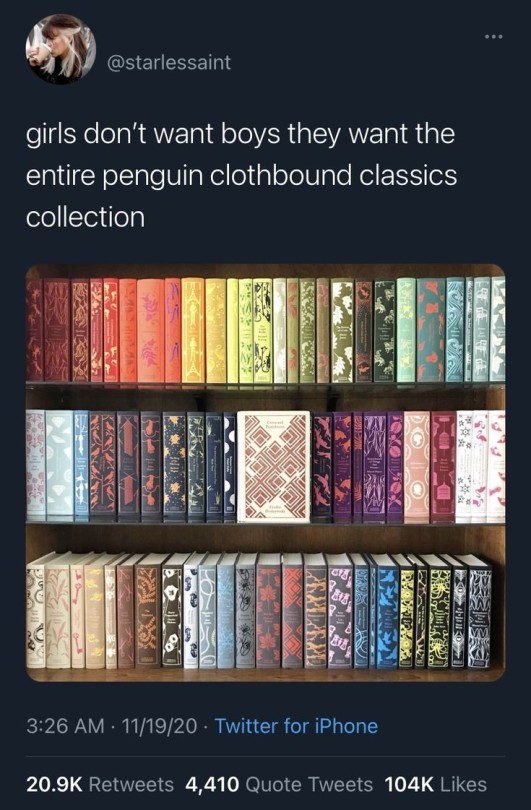
#aesthetic#books books books#books#booklr#bookblr#books & libraries#book quote#book review#book quotes#light academia#dark acadamia quotes#poetry#writers and poets#quotes#dark academia#wlw post#art#classic#classics#classic books
21K notes
·
View notes
Text
I'm almost never angry but all the hurt I've bottled inside me make me look like I'm someone with rage.
#bibliophile#book blog#bookish#books#bookworm#literature#spilled thoughts#book review#poems on tumblr#spilled poetry#poets on tumblr#original poem#poetry#quoteoftheday#quotes
4K notes
·
View notes
Text
How To Plan A Book Series: Ultimate Guide
Writing a book series can be an incredibly rewarding experience for authors, but it also requires careful planning and execution. A well-crafted book series can captivate readers, build a loyal fan base, and provide a steady stream of income for writers. However, planning a successful book series is no easy feat.
It demands a deep understanding of world-building, character development, and plot progression. In this ultimate guide, I'll help you explore the essential steps to help you plan a compelling and cohesive book series that will keep your readers hooked from start to finish.
Develop a Compelling Premise The foundation of any successful book series is a strong premise. Your premise should be unique, engaging, and have the potential to sustain multiple books. Consider exploring a complex world, a captivating concept, or a character with a rich backstory that can evolve over the course of several books. Ask yourself: What makes your premise stand out? What will keep readers invested in the story for multiple installments?
Create a Detailed Outline Before you dive into writing, it's crucial to create a detailed outline for your entire book series. This outline should include the overarching plot, major story arcs, character development, and key events for each book. Having a solid outline will help you maintain consistency, avoid plot holes, and ensure that each book contributes to the overall narrative. Don't be afraid to make adjustments as you write, but having a roadmap will keep you on track.
World-Building: Crafting a Vivid and Consistent Universe One of the hallmarks of a successful book series is a richly developed and immersive world. Whether you're creating a fantasy realm, a futuristic society, or a contemporary setting, pay close attention to world-building. Establish the rules, customs, histories, and geography of your fictional world. Consistency is key, so ensure that the details align across all books in the series. Consider creating a "bible" or a comprehensive guide that outlines the intricacies of your world, making it easier to maintain continuity.
Develop Compelling Characters Great characters are the heart and soul of any book series. Your protagonists, antagonists, and supporting characters should be well-rounded, multi-dimensional, and undergo significant growth and transformation throughout the series. Craft backstories, motivations, flaws, and strengths for each character, and ensure that their actions and decisions drive the plot forward. Remember, character development is an ongoing process, so be prepared to explore new facets of your characters as the series progresses.
Establish Recurring Themes and Motifs Themes and motifs are powerful tools that can add depth and resonance to your book series. Identify the central themes you want to explore, such as love, redemption, power, or identity. Weave these themes throughout the series, allowing them to evolve and deepen with each installment. Motifs, like recurring symbols or imagery, can also create a sense of cohesion and add layers of meaning to your narrative.
Plan for Cliffhangers and Resolutions One of the key strategies for keeping readers engaged in a book series is the strategic use of cliffhangers and resolutions. Cliffhangers create anticipation and leave readers craving for the next installment. However, be cautious not to overuse this technique, as it can become frustrating for readers. Balance cliffhangers with satisfying resolutions that tie up loose ends and provide a sense of closure, while still leaving room for the story to continue.
Consider Pacing and Narrative Structure Pacing and narrative structure are crucial elements to consider when planning a book series. Each book should have its own narrative arc, with a beginning, middle, and end, while also contributing to the overall story progression. Vary the pacing between books to maintain reader interest, alternating between action-packed and slower, more introspective sections. Experiment with different narrative structures, such as multiple perspectives, non-linear timelines, or frame narratives, to keep the series fresh and engaging.
Manage Continuity and Consistency As your book series grows, maintaining continuity and consistency becomes increasingly important. Keep detailed records of character descriptions, plot points, world-building elements, and timelines. Regularly refer back to these notes to ensure that you're not introducing contradictions or inconsistencies. Consider creating a series bible or a wiki to help you keep track of all the moving parts.
Plan for Character Growth and Evolution In a book series, characters should undergo significant growth and evolution. Plan for character arcs that span multiple books, allowing your protagonists and supporting characters to face challenges, make difficult choices, and emerge as changed individuals. This character development will not only add depth to your narrative but also keep readers invested in the journey of your characters.
Anticipate and Address Potential Plot Holes As your book series expands, the potential for plot holes and inconsistencies increases. Be vigilant in identifying and addressing these issues during the planning stage. Regularly review your outline and notes, looking for any logical gaps or contradictions. Enlist the help of beta readers or critique partners to provide fresh perspectives and catch any potential plot holes you may have missed.
Consider the Overarching Story Arc While each book in your series should have its own narrative arc, it's essential to plan for an overarching story arc that spans the entire series. This overarching arc should tie together the individual books, building towards a climactic conclusion that resolves the central conflict or mystery. Ensure that each book contributes to this larger narrative, advancing the plot and raising the stakes for the characters.
Plan for Marketing and Promotion Finally, as you plan your book series, don't overlook the importance of marketing and promotion. Develop a strategy for building buzz and engaging with your audience throughout the release of each book. Leverage social media, author events, book tours, and other promotional opportunities to keep your readers excited and invested in your series.
Remember, writing a book series is a marathon, not a sprint, so be prepared to invest time, effort, and dedication into crafting a truly remarkable literary journey. Hope this helped!
Happy Writing - Rin T.
Hey fellow writers! I'm super excited to share that I've just launched a Tumblr community. I'm inviting all of you to join my community. All you have to do is fill out this Google form, and I'll personally send you an invitation to join the Write Right Society on Tumblr! Can't wait to see your posts!
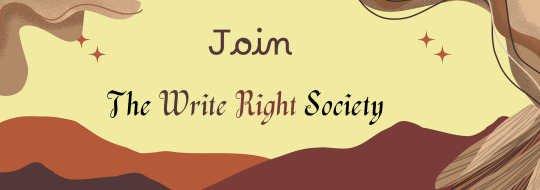
#creative writing#thewriteadviceforwriters#writeblr#on writing#writing#writers block#writers on tumblr#writing tips#how to write#writers and poets#writing advice#writing resources#novel writing#writing blog#writer#writer stuff#writerslife#creative writers#helping writers#writersociety#writerscommunity#resources for writers#ao3 writer#female writers#book series#book review#booklr#booktok#books and reading#fantasy fiction
3K notes
·
View notes
Text
Women, they have minds, and they have souls, as well as just hearts. And they've got ambition, and they've got talent, as well as just beauty. I'm so sick of people saying that love is just all a woman is fit for. I'm so sick of it.
[Almost crying]
But I'm so lonely...
Jo March little women





#aesthetic#light academia#romantic academia#academia aesthetic#chaotic academia#classic academia#dark academia#dead poets society#book review#donna tartt#jo march#literature
3K notes
·
View notes
Text
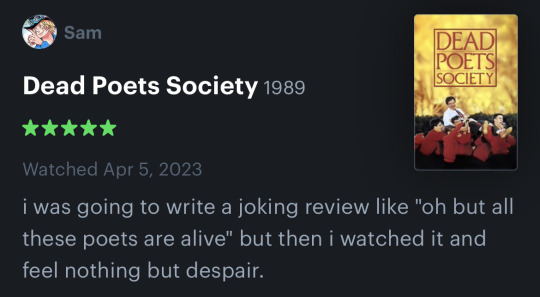
#letterboxd#movie#movie review#movie reviews#movies#movie recommendation#movie recommendations#review#reviews#dead poets society#dps#dps memes#dps fandom#dead poets fandom#dark academia#dead poets memes#robin williams#ethan hawke#robert sean leonard
4K notes
·
View notes
Text
Is it normal to be happy and sad and hurting and healing and mad and guilty and jealous and calm, all at the same time?
#words#classic literature#writers#spilled words#aesthetic#dead poets society#dark academia#poetry#poem#books and libraries#true words#my work#my words#quote#inspiring quotes#verses page#poesia#blog post#deadlypoetacademia#deadpoetsociety#book review#bookworm#booklr#bookish#quotes#poems on tumblr#tumblr#poets on tumblr#writers on tumblr#artists on tumblr
1K notes
·
View notes
Text

yeah, well
#writers on tumblr#art#tumblr#poetry#artists on tumblr#ao3#poets on tumblr#ao3 writer#writeblr#writers#archive of my own#ao3 tags#ao3 author#ao3fic#ao3 fanfic#ao3feed#fanfic writing#fanfiction#fandom#fanfic#writer problems#books#booklr#book review#bookworm#book#booktok#books and reading#book blog#reading
321 notes
·
View notes
Text

love elizabeth s.
#original poem#original quote#love elizabeth s#god#religion#religious trauma#relatable quotes#sad poem#sad thoughts#dark acadamia quotes#quotes#sylvia plath#virginia woolf#my poem#poetry#poetry community#spilled thoughts#spilled ink#spilled poem#poem#writing#books#booklr#reading#book review#book lover#dark academia#hozier#short poem#dead poets society
883 notes
·
View notes
Text
We humans spend a lot of time worrying about things that are simply out of our control. If you try to control things out of your reach, they end up controlling you instead.
#reading#life quote#poem#authors#book blog#paulo coelho#bibliophile#book review#motivation#book photography#writers#writerscommunity#writers on tumblr#writers and poets#writer stuff#creative writing#writing#writeblr#writing community#motivating quotes#lit#life quotes#quotes#quoteoftheday#literature#relationship quotes
718 notes
·
View notes
Text


Excerpts




***
Another 2* review from a courageous journalist.
130 notes
·
View notes
Text
Writing Description Notes: Physical Pain
Updated 6th June 2024 More description notes
It was as if his bones were made of glass, shattering into a million pieces with every movement and sending waves of sharp, shooting pain coursing through his limbs.
His muscles screamed in protest with every step, each movement sending jolts of electric pain shooting through his body.
The ache settled deep into his bones, a dull, persistent throb that seemed to resonate with every heartbeat.
Every inch of his body felt tenderized, as if he had been used as a punching bag in a brutal workout session.
The sensation of blood trickling down his skin was a grim reminder of the violence he had endured.
His ribs screamed in protest with every breath, each inhalation a sharp reminder of the blows he had taken.
The world seemed to spin around him in a dizzying blur, his vision clouded by the stars of pain that danced across his field of vision with every movement.
A sharp, stabbing sensation shot through his lower back, making him wince.
Her temples throbbed with a relentless, pounding headache.
He clutched his side, pain radiating from the bruise with every breath.
Her muscles screamed in protest, the soreness a reminder of yesterday’s workout.
A burning ache spread through his chest, each heartbeat intensifying the agony.
She bit her lip, trying to stifle the groan as pain flared in her twisted ankle.
His knuckles were raw and throbbing, evidence of the fight.
She pressed a hand to her forehead, a dull ache settling behind her eyes.
A searing pain lanced through his knee, nearly buckling his leg.
She gripped the edge of the table, knuckles white as pain shot through her arm.
Her trembling hands betrayed the unyielding agony in her joints, a relentless companion.
Doubled over, he fought against the relentless cramps that seized his stomach.
A sudden, searing pain in her wrist forced her to relinquish her grip, the cup clattering to the ground.
Every step reverberated through her aching feet, a reflection to the miles she had traversed.
Rubbing his shoulder provided little respite from the persistent agony that gnawed at the joint.
A sharp sting on her finger brought fresh irritation, the paper cut a small but sharp reminder of vulnerability.
His tooth throbbed incessantly, a deep, pulsating ache that clouded his thoughts.
Each movement of her stiff and sore neck elicited a fresh wave of discomfort, a constant reminder of strain.
A stabbing pain in his chest made each breath a struggle, a reminder of mortality's grasp.
The throbbing in his hand, where the door had slammed shut, served as a relentless reminder of his own clumsiness.
A dull ache settled deep within her lower back, rendering even sitting a feat of endurance.
His leaden legs protested with every step, each movement a symphony of agony.
His head spun, the pain behind his eyes making it hard to focus.
Sharp pangs in her side served as a reminder of the physical toll of her exertion, a stitch from pushing too hard.
His throbbing ankle, swollen and tender, made each step a test of willpower.
Gritting her teeth against the shooting pain, she cursed the strain from overuse that tormented her wrist.
Pressing a hand to his chest, he felt the pain radiate outward in relentless waves, a reminder of vulnerability.
Her burning shoulder protested each movement, the pain a constant reminder of her injury.
He winced as sharp pains flared in his elbow, each movement a reminder of his body's fragility.
A deep ache throbbed in her hip, a persistent discomfort that refused to be ignored.
His fingers tingled with pain, a result of gripping the tool too tightly for too long.
#creative writers#creative writing#fanfic review#fanfiction#fanfiction tips#helping writers#how to write#references for writers#wingfic#writer#writers#writers and poets#writers community#writers corner#writers of tumblr#writers on tumblr#writing#writing advice#writing community#writing help#writing inspiration#writing life#writing prompts#writing resources#writing tips#writing tips and tricks#writing description#descriptive writing
7K notes
·
View notes
Text
Somedays I want to pull my heart out of my chest just so I can stop feeling this way.
#bibliophile#book blog#bookish#books#bookworm#literature#spilled thoughts#book review#poems on tumblr#spilled poetry#poets on tumblr#original poem#poetry#quoteoftheday#quotes
2K notes
·
View notes
Text

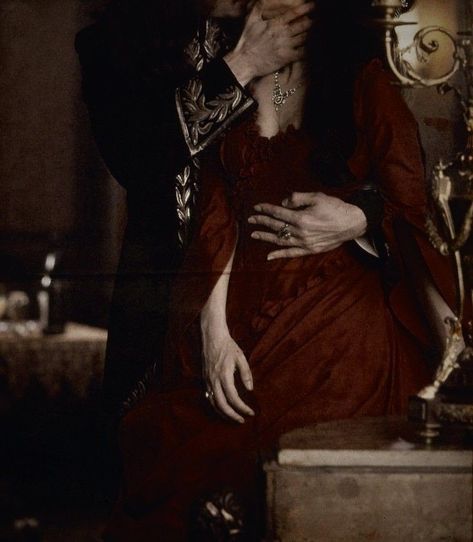


“The blood jet is poetry, There is no stopping it.”
-Sylvia Plath
#writers on tumblr#writers and poets#vampire#booklr#fantasy books#book recommendations#writeblr#dark acadamia aesthetic#aesthetic#dark romance#dark feminine energy#dark aesthetic#dark art#dark academia#twisted wonderland#horror#70s horror#horror films#sylvia plath#book review#vampire aesthetic#dark feminine aesthetic#vibes#lana del ray aesthetic#ldr aesthetic
174 notes
·
View notes
Text
“i know romeo and juliet is supposed to be about young love and ‘dumb teens’ but holy fucking shit, how dumb are you?” - some kid in my english class but probably also remus lupin at some point
#remus lupin#moony wormtail padfoot and prongs#moony#wolfstar#marlene mckinnon#marauders#marauders fandom#reading#taylor swift#study motivation#james fleamont potter#book review#studying#studyblr#booklr#bookish#bookblr#atyd#atyd marauders#cadence of part time poets#art heist baby#jegulus
835 notes
·
View notes